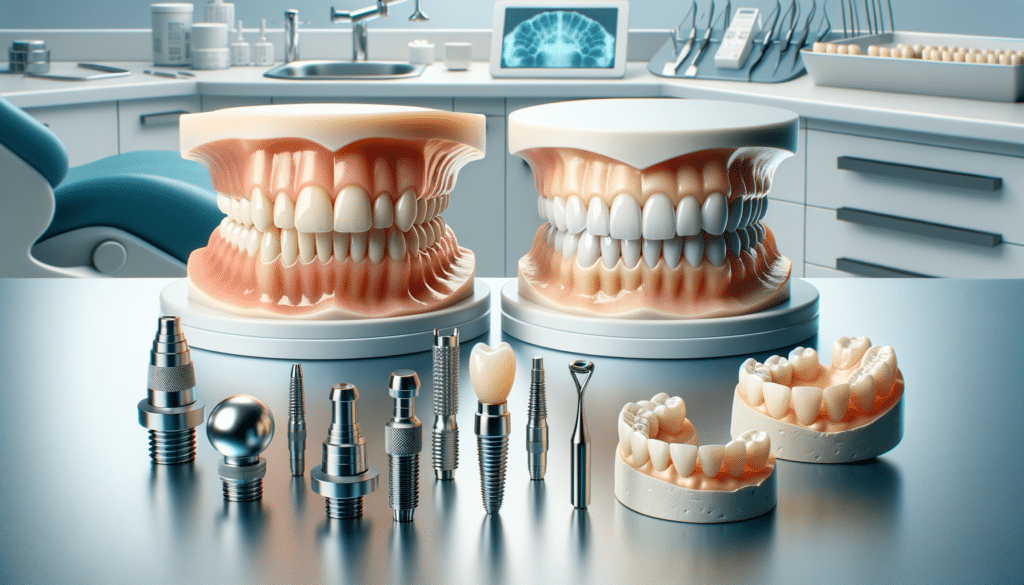Understanding Dentures: A Timeless Solution
Dentures have long been a cornerstone in the field of dentistry, providing individuals with a reliable solution for missing teeth. Traditionally crafted from materials like acrylic resin and metal, dentures are designed to closely mimic the appearance of natural teeth. They are removable and can be tailored to fit the unique contours of an individual’s mouth. The appeal of dentures lies in their accessibility and cost-effectiveness, making them a popular choice for many.
One of the key advantages of dentures is their versatility. They can be used to replace a few missing teeth (partial dentures) or an entire set of teeth (complete dentures). This adaptability ensures that individuals can find a solution that meets their specific needs. Additionally, modern advancements have led to the development of more comfortable and aesthetically pleasing denture options.
However, dentures do have their limitations. They may require periodic adjustments as the shape of the mouth changes over time, and they can sometimes cause discomfort or difficulty in eating certain foods. Despite these challenges, dentures remain a vital option for those seeking to restore their smile and improve their quality of life.
The Rise of Dental Implants: A Modern Marvel
In recent years, dental implants have emerged as a groundbreaking alternative to traditional dentures. Dental implants involve the surgical placement of a titanium post into the jawbone, which acts as a sturdy foundation for a replacement tooth or bridge. This innovative approach offers a more permanent solution for missing teeth and is renowned for its natural appearance and feel.
One of the most compelling benefits of dental implants is their durability. With proper care, they can last a lifetime, providing a long-term solution that eliminates the need for frequent replacements. Additionally, implants help preserve the jawbone, preventing bone loss that often accompanies missing teeth.
While dental implants offer numerous advantages, they also come with certain considerations. The procedure can be costly and requires a significant time investment, as the healing process can take several months. Furthermore, not everyone is a candidate for dental implants; adequate bone density and overall oral health are critical factors in determining eligibility.
Comparing Dentures and Dental Implants: Making an Informed Choice
When deciding between dentures and dental implants, several factors must be considered to make an informed choice. Cost is often a primary concern; dentures generally present a more affordable upfront cost compared to implants. However, dental implants may prove more cost-effective in the long run due to their longevity and reduced need for maintenance.
Comfort and convenience are also essential considerations. While dentures are removable and may require adhesives to stay in place, dental implants offer a fixed solution that feels more natural and secure. This can significantly enhance an individual’s ability to eat and speak with confidence.
Ultimately, the decision between dentures and dental implants depends on individual preferences, budget, and oral health. Consulting with a dental professional can provide valuable insights and guidance tailored to one’s specific situation.
Advancements in Dental Technology: Enhancing Options
The field of dentistry is continually evolving, with advancements in technology playing a pivotal role in enhancing options for tooth replacement. For dentures, innovations such as digital imaging and 3D printing have revolutionized the way they are designed and manufactured. These technologies allow for more precise fittings and improved aesthetics, enhancing the overall patient experience.
Similarly, dental implants have benefited from technological advancements. Techniques such as computer-guided implant surgery and the use of biocompatible materials have improved the success rates and comfort of the implant process. These innovations ensure that patients receive the highest quality care and outcomes possible.
As the dental industry continues to advance, patients can expect even more options and improvements in the future, making it an exciting time for those seeking to restore their smiles.
Conclusion: Embracing a New Smile
In conclusion, both dentures and dental implants offer viable solutions for individuals seeking to replace missing teeth and restore their smiles. Each option comes with its own set of benefits and considerations, making it essential for individuals to carefully evaluate their needs and consult with dental professionals.
Whether opting for the time-tested approach of dentures or the modern innovation of dental implants, the journey to a renewed smile is a personal one. With advancements in dental technology and a range of options available, individuals can confidently embark on their path to improved oral health and self-esteem.
Key considerations include:
- Cost: Dentures are generally more affordable initially, while implants may offer long-term savings.
- Comfort: Implants provide a more natural feel, whereas dentures may require adjustments.
- Longevity: Implants can last a lifetime with proper care, while dentures may need replacements over time.





